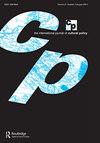Participation and cultural heritage management in Norway. Who, when, and how people participate
IF 1.6
3区 社会学
Q2 CULTURAL STUDIES
引用次数: 1
Abstract
Participation in democracy has been suggested as an inherent value of democracy by allowing citizens to participate in political decision-making. Since the 2000s and, more particularly, after the creation of the UNESCO Intangible Cultural Heritage Convention and the Council of Europe’s Faro Convention, there has been a call for a participatory approach to heritage management. In 2008 Norway ratified the Faro Convention justifying the existence of statutory participatory practices and community engagements. This paper assesses these practices as they read at the national legal provisions to evaluate how Norway articulates participative processes regarding cultural heritage management. The results indicate that the legal framework long for an active role of inhabitants in local administration and planning and heritage management but prevent them from influencing governance beyond the elections. Accordingly, cultural heritage management is still far from being considered a ‘sharing responsibility’ between citizens and authorities as the Faro Convention calls for.挪威的参与和文化遗产管理。谁、何时、如何参与
通过允许公民参与政治决策,民主参与被认为是民主的内在价值。自2000年代以来,特别是在联合国教科文组织《非物质文化遗产公约》和欧洲委员会《法鲁公约》成立之后,人们一直呼吁采取参与式的方式来管理遗产。2008年,挪威批准了《法鲁公约》,证明了法定参与性做法和社区参与的存在。本文评估了这些做法,因为他们在国家法律条款中阅读,以评估挪威如何阐明有关文化遗产管理的参与性过程。结果表明,法律框架渴望居民在地方行政、规划和遗产管理方面发挥积极作用,但阻止他们影响选举以外的治理。因此,文化遗产管理仍远未像《法鲁公约》所要求的那样,被视为公民和当局之间的“共同责任”。
本文章由计算机程序翻译,如有差异,请以英文原文为准。
求助全文
约1分钟内获得全文
求助全文

 求助内容:
求助内容: 应助结果提醒方式:
应助结果提醒方式:


